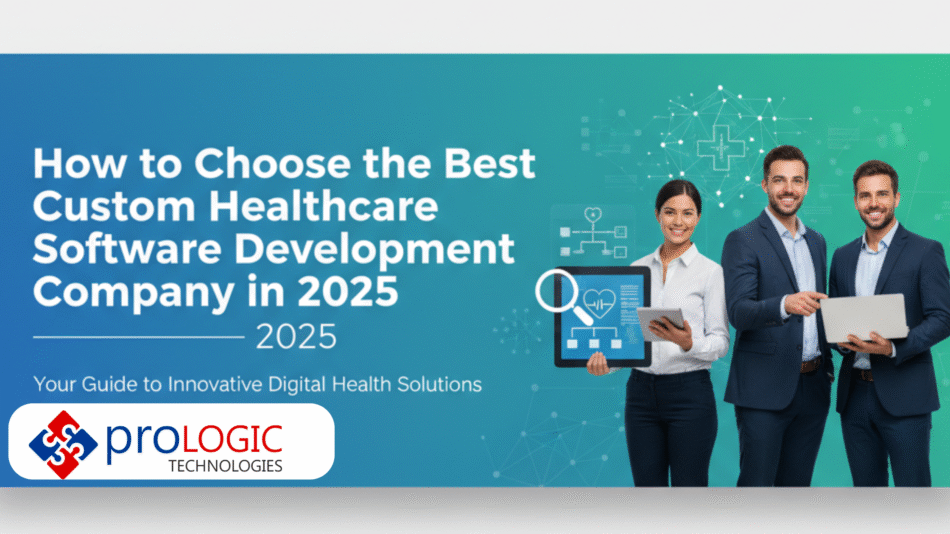Healthcare isn’t just about treatment anymore—it’s about technology that helps patients feel understood, cared for, and safe. Yet too many hospitals and startups still rely on platforms that are compliance-heavy, hard to use, and frustrating for patients and staff alike.
The game-changer? Partnering with the right custom healthcare software development company.
Choosing wisely in 2025 isn’t easy. The market is crowded, the jargon is endless, and AI hype often clouds the real impact of healthcare technology. This guide breaks down what to look for in a development partner and what red flags to avoid—so your organization invests in software that actually delivers.
Hospitals don’t need more technology—they need the right technology built by a team that understands patient care first, compliance second.
Why Custom Healthcare Software Beats Off-the-Shelf
Generic hospital software tries to cover too many bases, often leaving gaps in usability and scalability. By contrast, a custom healthcare software development company designs platforms tailored to your workflows, compliance needs, and patient experience goals.
With healthcare app development services, hospitals and healthtech startups can:
- Simplify complex processes like appointment management and billing
- Improve interoperability across systems like EHR, labs, and telemedicine platforms
- Personalize patient engagement through mobile apps and reminders
- Create scalable, cloud-ready systems that grow with organizational needs
7 Criteria for Choosing the Right Partner in 2025
1. Patient-Centric Approach Over Compliance-Only Thinking
Plenty of vendors focus on HIPAA, GDPR, and HITRUST checkboxes. Compliance is critical, but if the software frustrates patients, it fails. Look for a custom healthcare software development company that:
- Designs with user experience in mind
- Simplifies the care journey for both clinicians and patients
- Avoids bloated features nobody actually uses
2. Experience With Real-World Healthcare Challenges
A vendor should do more than pitch buzzwords. They should show how their solutions have solved challenges in real hospital environments. Case in point: Behavioral Health Case Study.
A strong partner knows that:
- AI is excellent for decision support and triage, not yet for autonomous diagnosis
- Patient portals must be simple enough for non-tech-savvy demographics
- Telemedicine requires more than video—it needs integrated scheduling, prescriptions, and follow-ups
3. Balanced AI Implementation (Avoid the Hype)
Yes, AI has transformed healthcare—but not in all the ways vendors promise. In 2025, practical AI shines in:
- Automating admin tasks like claim processing
- Detecting anomalies in imaging and monitoring data
- Predictive analytics for staffing and resource allocation
But beware of vendors overselling:
- Full automation in behavioral health without human oversight
- “AI doctors” replacing clinicians (regulators won’t allow it anytime soon)
- Overcomplicated algorithms that staff won’t trust or adopt
4. Proven Healthcare App Development Services
Mobile-first solutions are now table stakes. Patients expect to access records, book appointments, and communicate with care providers from their phones.
The right partner will:
- Provide native and cross-platform development expertise
- Focus on accessibility and inclusivity in design
- Integrate apps seamlessly with hospital IT systems
5. Scalability and Interoperability
The best software doesn’t just solve today’s problems—it’s future-proof. Ask your potential partner:
- How do your solutions scale across multi-location hospital networks?
- Can you integrate with existing EHR, IoT, or remote monitoring systems?
- How do you handle cross-border compliance in telemedicine?
6. Transparent Development Process
An expert custom healthcare software development company won’t hide behind tech jargon. They’ll:
- Share a clear roadmap with milestones
- Offer regular updates and feedback loops
- Involve hospital staff in usability testing before launch
7. Long-Term Partnership, Not Just Delivery
Healthcare isn’t static. Regulations change, patient needs evolve, and new technologies emerge. You need a vendor that offers:
- Ongoing maintenance and compliance updates
- Training for hospital staff and administrators
- Dedicated support for scaling and adding features
Common Mistakes to Avoid in 2025
- Falling for AI hype without asking where it practically fits
- Choosing cheapest over best-fit—saving upfront but losing on adoption and scalability later
- Ignoring patient engagement—patients won’t tolerate clunky portals anymore
- Not checking case studies—real-world success matters more than flashy presentations
Case in Point: Behavioral Health Platform
One hospital leveraged healthcare app development services to address gaps in behavioral health management. Instead of deploying a generic platform, they chose a tailored solution that:
- Integrated teletherapy sessions with secure scheduling
- Gave patients personalized reminders and self-care tools
- Allowed clinicians to monitor progress through intuitive dashboards
The result? Better patient retention, improved compliance, and reduced clinician burnout.
Technology that reduces friction for patients and providers is the kind that sticks.
Final Thoughts
Finding the right custom healthcare software development company in 2025 isn’t about picking the biggest vendor—it’s about choosing the one who understands your unique environment and patient needs.
Hospitals that succeed are those that:
- Embrace patient-centric software
- Invest in scalable, interoperable systems
- Stay realistic about what AI can and cannot do
If your hospital or healthtech startup is ready to move beyond one-size-fits-all software and build a platform tailored for both patients and providers, now’s the time to act.
👉 Request a Custom Healthcare Quote
Blog Recap
- The best partner combines compliance expertise with patient-centric design
- Practical AI matters more than hype
- Real-world case studies prove value over promises
- Long-term partnership ensures your hospital thrives beyond 2025
 WhatsApp Us Now
WhatsApp Us Now









